OPride
Tuesday July 31, 2018
by Zecharias Zelalem
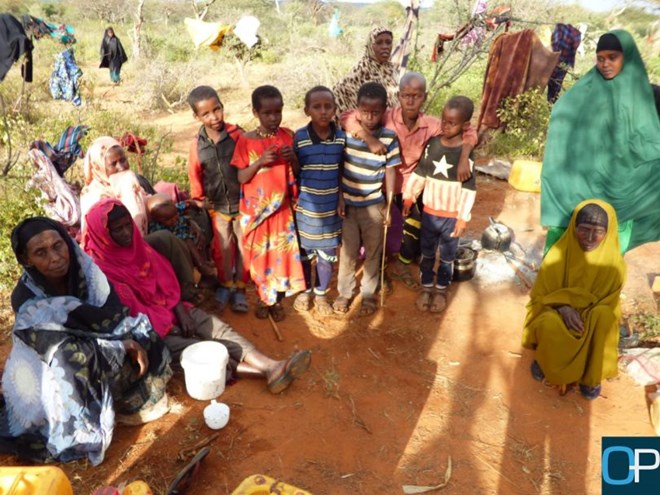
Moyale was once again the epicentre of carnage as a week’s worth of
it left around 50 people dead earlier this month. The town and its
environs, hotly contested between the Borana Oromo and Garri Somali
peoples who inhabit the area, often sees disputes lead to communal
clashes. However, the severity of what has transpired goes beyond the
templated shootout among pastoralists. Civilian areas have been
targeted, women and children have died, infrastructure has been damaged.
The federal government has been slammed for what is deemed to be its
lackadaisical approach to the conflict.
“I’ve been shot in three places. I’m lucky to be alive,” Hussein Ali 44, told Opride.
He is among 45 Garri Somali patients being treated at Moyale’s Central
Hospital. “They were Oromo, some had machine guns, others used branches
to set houses on fire. They shot all my neighbours. They burned
everything, even the small shops.” Hundreds of people belonging to the
Garri Somali clan are believed to have been displaced from their homes
by the violence. A yet to be determined number of them have fled across
the border into Kenya.
The Oromo and Somali of Moyale and its surrounding region have
intermingled and resided in each other’s territories for centuries.
Located near the Kenyan border some 750km south of Addis Ababa, the town
is a business post on the doorstep of a lucrative Kenyan market. Both
Somalis and Oromos lay claim to the town and clashes among pastoralists
from both communities date back to the 19th century when Emperor Menelik
presided over the Abyssinian empire. “We would hear of shootouts, of
fighting in the rural areas,” said Girma Gutema, a renowned Oromo
activist who hails from the region and is currently a PhD student in
Norway. “Those of us who lived in the town were never involved in this
sort of fighting. But those who lived off the land in the rural areas
would fight for land from time to time. It’s something that has been
going on for a long time.”
Far from the mitigating presence one might expect it to be, Addis
Ababa has historically sought to exploit the dispute to serve political
needs and can arguably be blamed for exacerbating tensions between the
two groups.
During the 1970ies, the Ogaden war with neighbouring Somalia resulted
in a portion of the country’s Somali region falling under occupation by
troops loyal to President Siad Barre’s Somali National Army. In 1987,
the President Mengistu Hailemariam led Derg government established the
Borena autonomous region, which encompassed all of Moyale and its
surroundings. The move was likely fueled by suspicion of the Garri and
their being deemed as collaborators for the Somali army and the Western
Somali Liberation Front (WSLF) insurgent group. It gave the Borana
unrestricted freedom to roam across the rural landscape without contest.
Later, after the fall of the Derg, the ruling Ethiopian People’s
Revolutionary Front (EPRDF) split the region and the town of Moyale into
the Somali and Oromia ethnic regions. Under Meles Zenawi, the EPRDF’s
policy included arming Garri militias to chase after the Oromo
Liberation Front (OLF). Empowered by the tacit support from the federal
government, Garri militias also went after their Borana counterparts and
the once sporadic clashes increased in frequency throughout the 90ies
and into the new millennium. In recent times, the emergence of another
federal government backed armed force, the Somali State Liyu Police has
served to drastically exacerbate the situation. The regional
paramilitary force has been accused of venturing into the contested
areas and killing
Borana pastoralists, who wouldn’t stand a chance against the heavily
armed well trained Liyu Police. Last year, they were key instigators of
the Oromo/Somali communal violence that led to a general breakdown of
order and the displacing of over a million people.
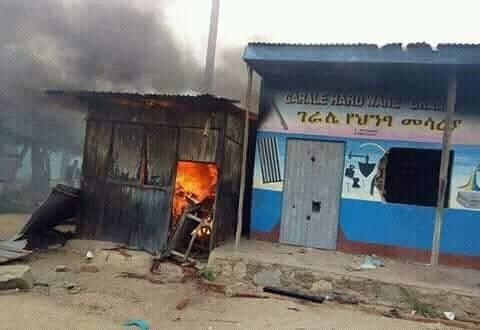
Businesses
set ablaze. Images of the destruction have been circulating on social
media for much of the past week. The owner of Garale Hardware story,
Maalim Ahmed, wasn’t present during the attack and is safe
The ascension of Abiy Ahmed to the Premiership in April hasn’t
brought much change to the region. Lauded for reformist policies, he is
yet to get his hands dirty in solving the age-old Borana-Garri
pastoralist conflict.
Adan Kulow, a Moyale born Nairobi based humanitarian law expert and
Garri activist says that tension had been brewing for much of the past
year.
“Over the past ten months or so, both sides have been launching tit
for tat attacks against each other,” said Adan, who makes frequent trips
to the region. “The federal government turned a blind eye to the
conflict and with time it worsened.”
On Tuesday July 10th, clashes between pastoralists outside of the
town killed some ten people. But it is what followed over the next three
days that has shocked the inhabitants of the region.
“Clashes between the two date back over a hundred years,” explains
Adan. “But we saw Oromo militia carry out an unprovoked massacre of
around 50 civilians who were completely uninvolved in the violence. This
is not just another dispute for land. They brought their weapons into
villages that are normally spared from this sort of thing.”
Between the 11th and the 13th, villages in the areas of Chamuq, Malab
and Hararsam were completely razed to the ground. The villages targeted
were inhabited primarily by the Garri. People were massacred and
property set ablaze, sometimes with their doomed owners inside. The
perpetrators appear to have been members of an armed Oromo militia.
“We could hear them laughing and taunting us in the Oromo language,”
said Mohammed Abdi, 29. Mohammed is in danger of being unable to walk
again after taking a bullet to the right knee. His hand was grazed by
another bullet. “The federal government has failed us,” Mohammed said.
“I saw them shoot men in front of their wives. Why is noone coming to
our rescue? Why is (Prime Minister) Abiy doing nothing when we are dying
in our homes?”
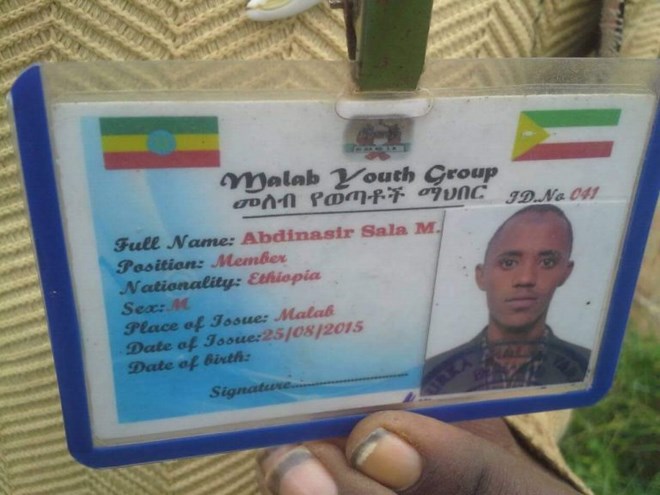 Abdinasir
Sala M, a victim of the massacre in Malab. His murderers posted a
picture of his id card on Facebook, showing he was a member of a local
youth group. Images far too graphic to public here appear to show his
dead body with those of about six other men. All appear to have been
gunned down
Abdinasir
Sala M, a victim of the massacre in Malab. His murderers posted a
picture of his id card on Facebook, showing he was a member of a local
youth group. Images far too graphic to public here appear to show his
dead body with those of about six other men. All appear to have been
gunned down
Mohammed, who is being treated at the Moyale Central Hospital,
described his attackers as being a mix of armed militants with gangs of
youth. According to him, some of the militants wore camouflage uniforms.
Mohammed insists that these were Oromia regional security forces.
Also being treated at the same hospital is Abiya Abdishekur, 70, who
lost four children when her village was attacked on the night of the
13th. Abiya, who lives in the Malab kebele, some 10 km away from Moyale,
recounted her horrific experience through a translator.
“I woke up and couldn’t breathe. There was fire and smoke everywhere.
I put a piece of clothing over my nose and tried to run. I couldn’t
even see my family, my eyes burned. I got out but I fainted soon after.”
Abiya suffered severe burns. But seven members of her family,
including four of her children succumbed to either smoke inhalation, or
were burnt alive. She believes OLF rebels carried out the attack.
“Oneg,” she said, using the Amharic language acronym for the group.
Not all believe it was the OLF. “The Oromia regional government are
responsible,” explains Farah Muktar, who was at the hospital tending to
his wife, injured in a similar attack. “It isn’t the OLF. It’s members
of the regional forces. They want to avenge the victims of the Liyu
Police by killing innocent Somalis.”
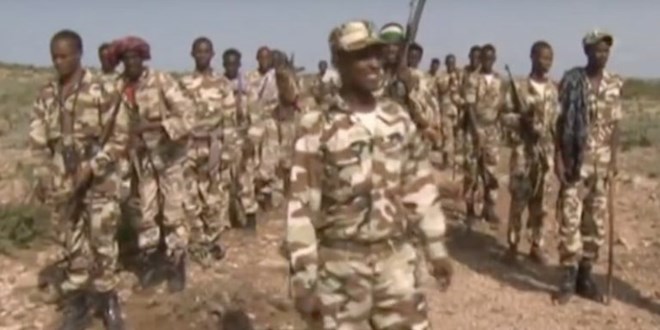 Members
of the Liyu Police. The regional paramilitary force is accused of
killing almost 40 people in Oromia’s Chinaksen district in a series of
attacks on communities between June and July
Members
of the Liyu Police. The regional paramilitary force is accused of
killing almost 40 people in Oromia’s Chinaksen district in a series of
attacks on communities between June and July
The Somali regional Liyu Police force is believed to have been
responsible for a number of raids into the Eastern Hararghe Zone of
Oromia over the past month. The town of Chinaksen alone, has been
especially brutalized. In an interview
with the Voice of America’s Amharic language program last week, Omar
Abdullah from the Chinaksen district administration communication’s
office stated that 38 people had been killed over the past month. “They
(Liyu Police forces) kill women, children and the elderly. They burnt
everything and kill anyone they see. We know of our own losses, but even
more have been killed in Babile and elsewhere.”
The attacks against the Oromo populations in Eastern Hararghe came
barely a month after rights group Amnesty International called on the
Ethiopian government to disband
the Liyu Police paramilitary group. Whether or not the attacks against
the Garri Somali clan in and around Moyale were to avenge Liyu Police
raids into Oromia isn’t clear. But if they were, the Liyu Police haven’t
been targeted in any way.
“After the federal government declared a state of emergency,
the Liyu Police retreated from Moyale,” explained Ibrahim Haro, a
former member of the Somali State parliament and member of the Garri
clan. “They haven’t been here in four months.”
Ibrahim criticizes the federal government’s inaction. “We have fought
to prevent Al Shabab militants from crossing into the country from
Somalia. We keep the border safe from foreign threats. But when our
people are being butchered like animals, they don’t even talk about us
in Addis Ababa.”
According to the former Somali State MP, countless members of the
Garri clan have been displaced since last week, although he stopped
short of stating a number. “Many have crossed the border,” he said.
“Many have sought refuge in the Garri Somali territories on the Kenyan
side of the border.”
Opride has been able to confirm that the Garri Somali
community in Kenya has been able to take up their concerns with the
highest level of Kenyan government. Members of the community as well as
several Kenyan Somali MPs were also given an audience with Ethiopia’s
ambassador to Kenya, Dina Mufti.
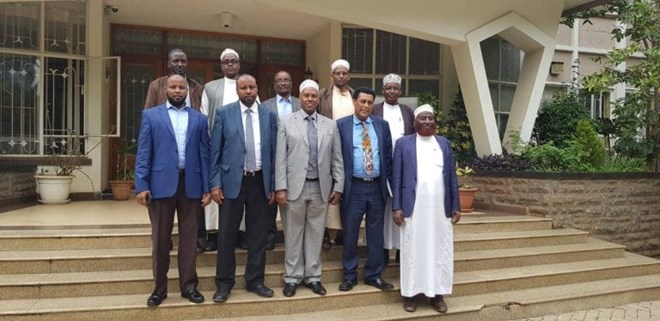 Dina Mufti (second from bottom right) meeting with Garri elders and Kenyan Somali MPs last week
Dina Mufti (second from bottom right) meeting with Garri elders and Kenyan Somali MPs last week
Possible involvement of the Oromia state government?
A Borana Oromo resident of Moyale, who spoke to Opride on
the condition of anonymity, denied that Oromia State President Lemma
Megersa ordered the massacre, but agrees that Oromia state elements are
involved. “Members of the Borana community collected donations from
people demanding action be taken to defend our communities. This money
was collected and used to recruit gunmen and among them are members of
the regional security forces. But I don’t condone what they’ve done,
nobody asked them to burn down villages and massacre people.”
“Garri Somali gunmen are partially responsible for this mess. They
have been terrorizing people in the town of Moyale for months now,”
explained the individual. “Moyale has always been a thriving business
town. But in recent months, members of the Garri militias have carried
out shootings and carjackings in the town itself on anyone who isn’t
Garri. The area between the city’s bus terminal and the Great Mosque
used to be business wise, the most lucrative part of Moyale. Now it’s
too dangerous to go there. In just four months, they turned that area
into a ghost town.”
The individual laments the situation in Moyale. “The region is
divided. The Garri militias have not only cordoned off the areas of
Moyale between the mosque and bus terminal, but they have dug trenches
there. Meanwhile our forces are committing atrocities that make them no
better than the Liyu Police. It’s horrible.”
Adan Kulow told Opride that despite the presence of a
federal army base in town, Ethiopian soldiers have refrained from
getting involved. A commander from the base allegedly told a Garri
community leader that as there was no longer a nationwide state of
emergency, this was an issue to be dealt with at state level.
“Basically we were told that we were on our own.” he sounded resigned.
The Prime Minister may have ordered the mobilization of federal troops towards areas along the Oromo Somali border in recent weeks, but residents in Moyale tell Opride
there has been no new movement of troops towards their region. For now,
there appears to be a letup in the violence. Despite this, tensions are
high and the situation remains precarious.